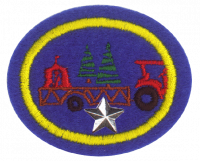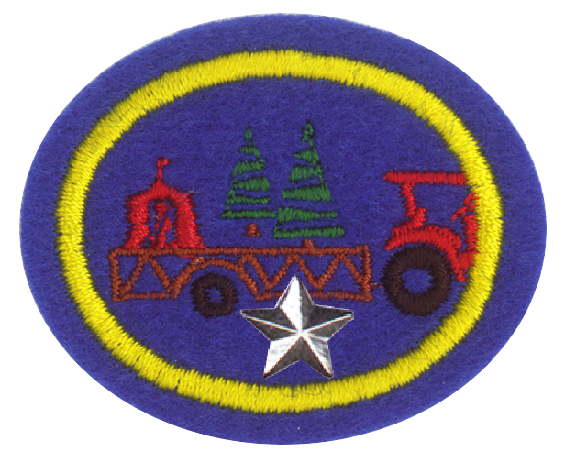AY Honors/Parade Floats - Advanced/Answer Key
Skill Level
3
Year
2009
Version
21.02.2026
Approval authority
General Conference
1
For tips and instruction see Parade Floats.
2
Note: Risk Management (adventistrisk.com) has guidelines listed on their website concerning safety management.
Ladders
Any ladder purchase in the past 20 years or so will be covered with warning labels. Read them. In general, they will say the following:
- Do not climb a ladder unless it is stable, steady, and all its legs are on solid ground.
- The second highest step (of a step ladder) will be labelled with a warning that says Do not stand on or above this step. Heed that warning.
- Keep your weight centered between the ladder's upright rails. This means you should not lean out away from the ladder to either side. If you can't reach something without leaning out, get off the ladder and move it. Yes, it's inconvenient, but so are ambulance trips and broken bones.
- Be sure a step ladder's braces are locked.
- Do not climb the back of a step ladder, or stand on the paint/tool holder.
- Keep the steps dry and clean.
- Wear slip-resistant shoes.
- Keep aluminum ladders away from electrical wires.
- Set a ladder up at the proper angle. If too steep, it could fall backward with you on it, or you could fall off. If too shallow, it may not be able to hold your weight without breaking, or it could slip out from under you. Ladders are usually marked with angles of proper use.
Hand tools
- Use tools for the purposes intended. The right tool for the job is always safer.
- Wear hand, eye, and arm protection as needed.
- Be aware of what tools nearby volunteers are using and who is nearby when you are using tools.
- Keep tools in good working order, with no loose blades or handles. Blades should be kept sharp.
Knives
- Keep your blades sharp. A dull knife is difficult to push through wood, requiring additional force. When the wood finally gives, the blade keeps going.
- Always push the blade away from you, and constantly consider where the blade will go.
- Keep your fingers clear of the blade at all times.
- When splitting wood with a knife, do not hammer on the back of the blade. This weakens the attachment to the handle and deforms the blade.
- Close a pocket knife when it's not in use or when you are carrying it.
- Keep all blades away from heat. Heat will remove the temper, softening the blade. A soft blade will not hold an edge, making it nearly impossible to keep it sharp.
Power equipment
Same considerations as hand tools plus:
- Do not overload circuits
- Do not tamper with plugs by removing the ground post
- Water and power do not mix
3
We presume that this means a different float than built to meet the requirements of the Parade Floats Honor. Some Pathfinders can earn the basic honor on this float, while Pathfinders who have already built a float can help design and supervise the same float for the Advanced honor.
3a
This could be a small trailer or truck bed, it is not very big.
3b
Such elements make the float more interesting. Usually a gas powered generator is employed to drive the moving parts of the float. How to do this is outside the scope of this answer key. Please see the References section and search out other information on float animation.
4
4a
A good float design plan will have a materials list. Getting the materials on hand first will reduce wasted volunteer time and frustration.
4b
A good float takes time to build, so putting in at least 6 hours should not be a problem.
4c
This requirement contemplates that multiple Pathfinders are able to work on the Advanced Honor together by dividing up the design and construction.
5
Many parades will welcome a Pathfinder float, so go forth and parade!


